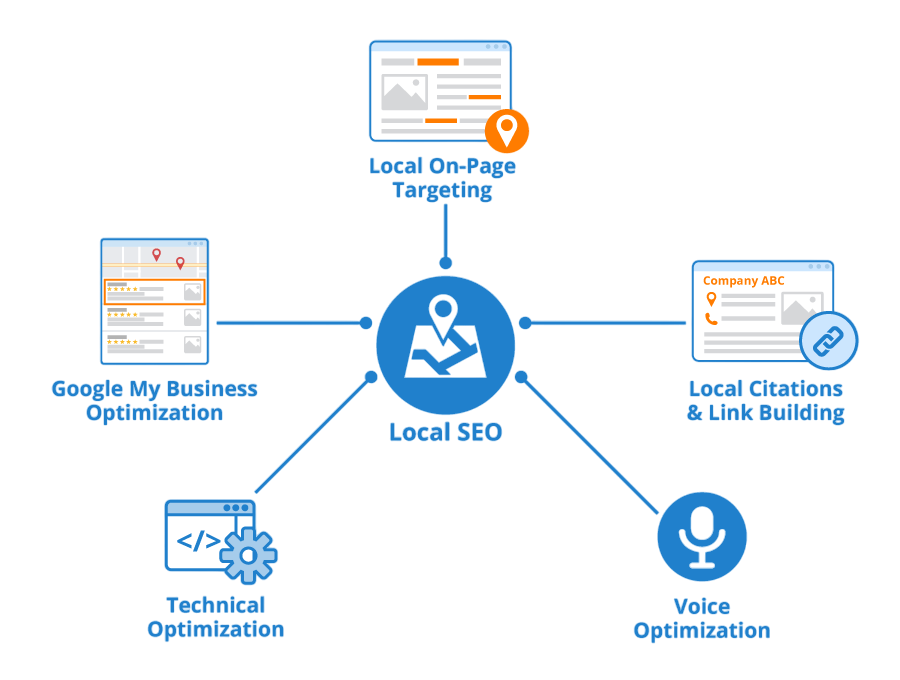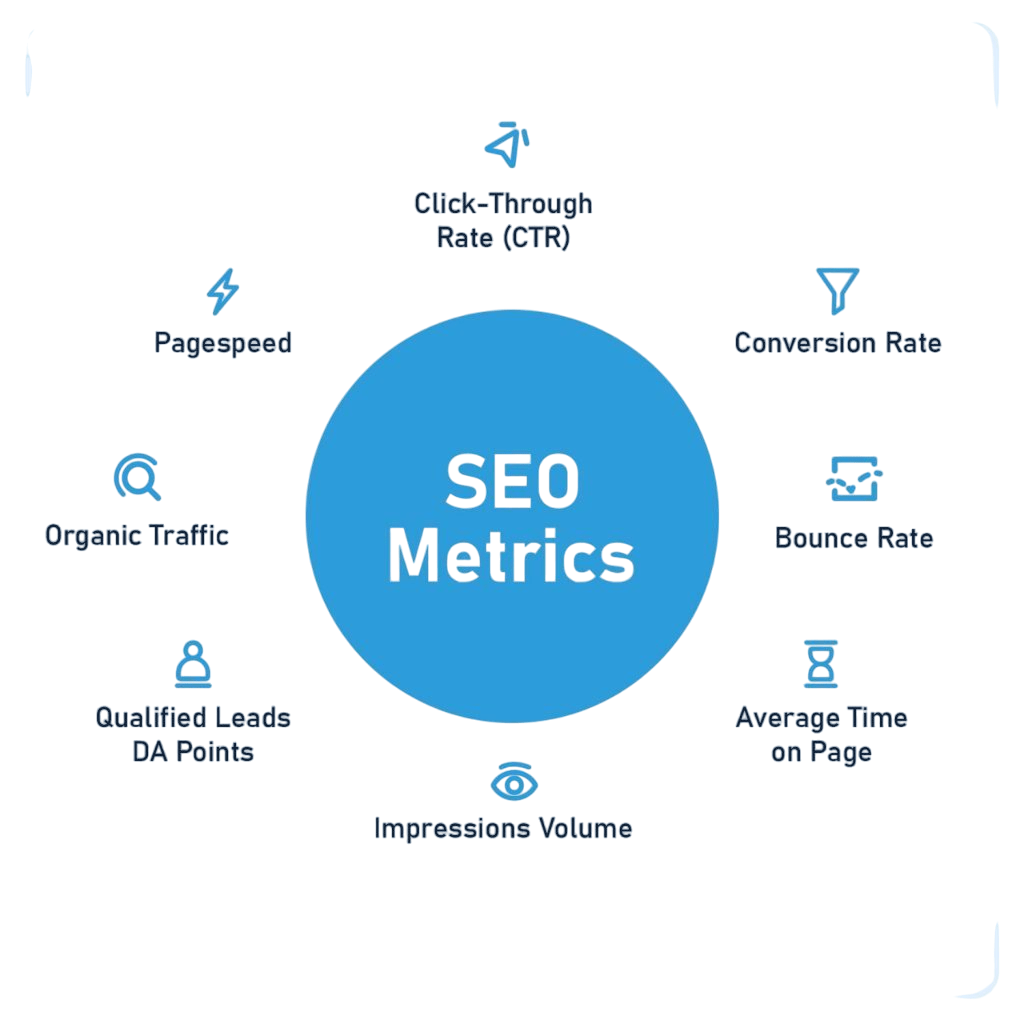
- Introduction: The Power of Local Search
- What Is Local SEO?
- Why Local SEO Is Important for Your Business
- Key Components of Local SEO
- Step-by-Step Local SEO Strategy
- How to Measure Local SEO Success
- Common Local SEO Mistakes to Avoid
- Future Trends in Local SEO
- Conclusion
Introduction: The Power of Local Search
In today’s fast-paced digital world, customers don’t flip through phone books or rely solely on word-of-mouth. Instead, they grab their smartphones and search phrases like “best pizza near me” or “electrician in Brooklyn.” This is the power of local search and businesses that want to thrive locally need to harness it. Local SEO (Search Engine Optimization) helps businesses promote their products and services to local customers when they’re searching for them. Whether you’re a coffee shop, a dentist, or a home service provider, Local SEO can drive foot traffic and boost revenue.In today’s digital landscape, local search has become a powerful tool for connecting businesses with nearby consumers. Whether someone is looking for a coffee shop, a plumber, or a boutique clothing store, chances are they’ll turn to their smartphone or computer to find a solution close to home. This shift in consumer behavior has made local search engine optimization (SEO) more important than ever. Local search focuses on optimizing a business’s online presence so it appears prominently when users search for services or products in a specific geographic area. With tools like Google Business Profile, customer reviews, and location-based keywords, businesses can significantly increase their visibility to local customers. What makes local search so impactful is its intent-driven nature. People searching locally are often ready to act, whether it’s making a purchase, Digital Marketing Training visiting a store, or booking a service. This high-conversion potential makes local search one of the most cost-effective marketing strategies for small and medium-sized businesses. Understanding and leveraging the power of local search allows businesses not only to compete with larger corporations but also to become trusted staples in their communities. As digital technology continues to evolve, mastering local search is no longer optional; it’s essential for sustained growth.
Ready to Get Certified in Digital Marketing? Explore the Program Now Digital Marketing Online Training Offered By ACTE Right Now!
What Is Local SEO?
Local SEO (Search Engine Optimization) is the process of optimizing a business’s online presence to attract more customers from relevant local searches. These searches typically include location-specific keywords or phrases such as “best pizza near me” or “plumber in Chicago.” Local SEO helps ensure that a business appears prominently in search engine results especially in Google’s local pack, map listings, and organic rankings when potential customers look for services in their area. Key elements of local SEO include creating and optimizing a Google Business Profile (formerly Google My Business), managing online reviews, using local keywords, building local backlinks, and ensuring consistent business information (name, address, and phone number) across directories.

Unlike traditional SEO, which focuses on improving visibility on a national or global scale, local SEO is targeted and intent-driven. It’s especially important for brick-and-mortar businesses or service providers that rely on local clientele. When done effectively, local SEO increases foot traffic, phone calls, website visits, and customer engagement making it a vital part of any local marketing strategy.
Why Local SEO Is Important for Your Business
- Increases Local Visibility: Helps your business appear in local search results, maps, and directories when customers search for services nearby.
- Drives High-Intent Traffic: Attracts customers who are actively looking for your products or services and are ready to take action.
- Builds Trust and Credibility: A well-optimized Google Business Profile and positive online reviews enhance your business’s reputation and reliability.
- Boosts Foot Traffic: Local SEO can lead more people to visit your physical location by providing accurate directions, hours, and contact information.
- Cost-Effective Marketing: Compared to paid advertising, local SEO delivers long-term results with a lower investment, especially for small businesses.
- Improves Mobile Reach: With the majority of local searches happening on smartphones, local SEO helps you connect with on-the-go consumers.
- Outranks Local Competitors: Gives you a competitive edge by ranking higher in local search results than other nearby businesses.
- Enhances User Experience: Ensures that your online information is accurate, up-to-date, and easy for customers to find and use.
- Supports Business Growth: More visibility and engagement lead to increased leads, sales, and repeat customers.
- Local Keyword Research: Using location-specific keywords (e.g., “dentist in Austin”) in your website content, titles, and meta descriptions helps you rank for relevant searches.
- NAP Consistency (Name, Address, Phone Number): Ensuring your business information is consistent across all online directories (Google, Yelp, Facebook, etc.) builds trust and boosts local rankings.
- Online Reviews and Ratings: Encouraging happy customers to leave positive reviews, and responding professionally to all feedback, strengthens your reputation and improves visibility.
- Local Citations: Listings of your business in trusted online directories (like Yelp, TripAdvisor, and Yellow Pages) that confirm your business details to search engines.
- Mobile Optimization: A mobile-friendly website is essential since most local searches happen on smartphones.
- Local Link Building: Getting backlinks from local websites, blogs,SEO Mistakes and business associations boosts your domain authority and local relevance.
- Location Pages & Local Content: Creating location-specific pages or blog content helps search engines understand your service areas and target audience.
- Map Pack (Local Pack) Presence: Optimizing to appear in Google’s “3-Pack” (top map listings) gives you prime real estate in search results.
- Behavioral Signals: Clicks, call-through rates, and user engagement are signals Google uses to evaluate your local relevance.
- Claim and verify your profile.
- Add accurate business details (name, address, phone, hours, website).
- Upload photos, add services, and post updates regularly.
- Collect and respond to customer reviews.
- Make sure your Name, Address, and Phone number (NAP) are identical across all.
- platforms: your website, social media, directories, and review sites.
- Use tools like Moz Local or BrightLocal to find and fix inconsistencies.
- Include location-based keywords (e.g., “plumber in Dallas”) in page titles, meta descriptions, and content.
- Create service area or location-specific pages if you serve multiple areas.
- Submit your business to trusted online directories (Yelp, Yellow Pages, Bing Places).
- Get backlinks from local blogs, news sites, and community organizations.
- Ask happy customers to leave reviews on Google and other relevant sites.
- Respond to all reviews promptly to build trust and show engagement.
- Inconsistent NAP Information: Using different business names, addresses, or phone numbers across websites and directories confuses search engines and customers.
- Ignoring Google Business Profile Optimization: Leaving your profile incomplete or outdated means missed opportunities for visibility and engagement.
- Lack of Local Keywords: Not including location-specific keywords on your website makes it harder for local customers to find you in search results.
- Not Collecting or Responding to Reviews: Reviews are a key ranking factor and trust signal. Ignoring them can harm your reputation and local SEO performance.
- No Mobile Optimization: If your website isn’t mobile-friendly, you risk losing the majority of local users who search via smartphones.
To Explore Digital Marketing in Depth, Check Out Our Comprehensive Digital Marketing Training To Gain Insights From Our Experts!
Key Components of Local SEO
Google Business Profile (GBP) Optimization: Claiming and fully optimizing your Google Business Profile is crucial. This includes accurate business information, categories, hours, photos, and regular updates.
Step-by-Step Local SEO Strategy
Step 1: Optimize Your Google Business Profile
Step 2: Ensure NAP Consistency Across the Web
Step 3: Use Local Keywords on Your Website
Step 4: Build Local Citations and Backlinks
Step 5: Get and Manage Customer Reviews
Looking to Master Digital Marketing? Discover the Digital Marketing Expert Masters Program Training Course Available at ACTE Now!
How to Measure Local SEO Success
Measure Local SEO Success of your local SEO efforts is essential to understand what’s working and where improvements are needed. One of the primary indicators is your Google Business Profile (GBP) Insights, which provides data on how many people found your listing, what actions they took (calls, direction requests, website visits), and what keywords they used. Local search rankings are another critical metric monitor your position for key local keywords on Google Maps and in the local “3-pack.” Additionally, website analytics tools like Google Analytics and Google Search Console can show you how much local traffic your website is receiving, what pages they’re visiting, Digital Marketing Training and how long they’re staying. Customer reviews and ratings also serve as a success indicator; a steady stream of positive reviews signals strong local engagement and improves visibility.

Tracking the number of local citations and backlinks can show how well your online presence is expanding. Finally, measure tangible business results such as increases in foot traffic, appointment bookings, phone calls, or online inquiries from local customers. Regularly reviewing these metrics allows you to fine-tune your strategy and maintain a strong presence in your local market.
Common Local SEO Mistakes to Avoid
Future Trends in Local SEO
As digital behavior continues to evolve, local SEO is also shifting to meet the demands of more tech-savvy, mobile-first consumers. One major trend is the increasing importance of voice search, with users asking devices for local recommendations like “best pizza near me” or “24-hour plumber nearby.” To stay competitive, businesses will need to optimize for conversational, long-tail keywords and natural language queries. Another growing focus is AI-driven search personalization, where search engines tailor results based on user behavior, preferences, and real-time location. This makes consistent, hyper-local content more valuable than ever. Additionally, zero-click searches where users get answers directly on the search page without visiting a website are becoming more common, making features like Google Business Profile, FAQs, and structured data essential. Visual search and video content may also play larger roles, especially in retail and service industries. Lastly, online reputation management will continue to influence rankings, as consumers rely more on reviews and ratings. Businesses that adapt to these trends by creating localized, high-quality, and user-focused content will be better positioned to dominate the local search landscape in the years ahead.
Preparing for Digital Marketing Job Interviews? Have a Look at Our Blog on Digital Marketing Interview Questions and Answers To Ace Your Interview!
Conclusion
Local SEO is no longer optional, it’s essential. Whether you’re a single-location business or a multi-location brand, local search optimization ensures that your customers can find you when it matters most.Investing time and resources into local SEO means getting ahead of your competition, building trust with your audience, and increasing your revenue through qualified local traffic.Local SEO is no longer optional it’s a crucial strategy for any business looking to connect with nearby customers and stay competitive in a digital-first world. By optimizing your online presence through tools like Google Business Profile, using location-specific keywords, earning positive reviews, Digital Marketing Training Measure Local SEO Success and maintaining consistent business information, Key Components of Local SEO can significantly boost your visibility in local search results. As technology and user behavior evolve, staying up to date with local SEO best practices and emerging trends is essential for long-term success. Whether you’re a small local shop or a multi-location service provider, investing in local SEO ensures that your business is found by the right people, at the right time, and in the right place.




